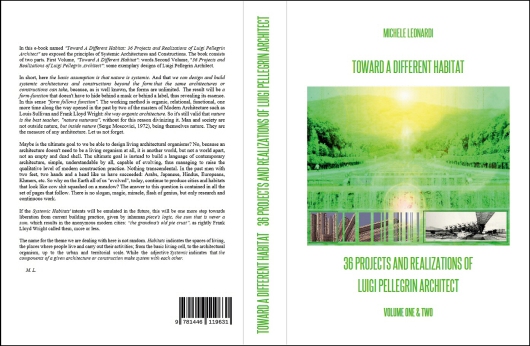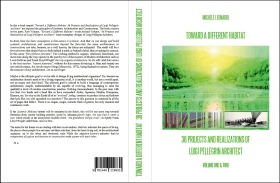VOLUME 1
TOWARD A DIFFERENT HABITAT
VOLUME 2
36 PROJECTS AND REALIZATION OF
LUIGI PELLEGRIN ARCHITECT
An essay by Michele Leonardi Architect © S.I.A.E. Italy - All rights reserved.
Translated by Michele Leonardi Architect © All rights reserved.
VOLUME 1
CHAPTER 1
excerpt
DO WE WANT
A DIFFERENT HABITAT?
At the end of 18th century the English economist Thomas Robert Malthus in his “An Essay on the Principle of Population, as it Affects the Future Improvement of Society”, predicted a sure future of misery for all humanity.
The so-called Malthus principle states that population tends to increase rapidly according to an exponential progression, while the availability of resources grows slowly and steadily according to a linear progression.
In short, following this principle, the numerical growth of the human population would not be accompanied by a concomitant capacity by population itself to make adequate means of subsistence available for each individual.
Hence there would arise an insufficiency of basic necessities unavailable to the entire population, a shortage that could be balanced, according to Malthus, only by late marriage, otherwise by wars, famines and epidemics. [1]
You don't need a graphic diagram to understand that if we asphalt and cement the most fertile lands, which are often found right next to big cities, if we catch all the fish that can be caught without any rules, if we burn or cut, as humanity, the primary forests to create pastures and monocultures, or contribute to their destruction [2] due to our excessive consumption of meat, timber and so on, sooner or later in the name of economic growth we will end up like the inhabitants of Easter Island.
Therefore we do not want here to question the existing relationship between human population and availability of resources, between man and the environment, nor to discuss the true or false problem of birth control, [3] nor whether all the evils of the world can be blamed on human idiocy, or on the capitalist socio-economic system, which is also in decline given its ever-recurring crises.[4]
Rather, here we want to highlight how contrary to any type of realistic forecast on the tragic destiny of humanity, two more centuries have passed since 1798, i.e. since the publication of the Malthusian essay, and the more or less explicitly announced end of the world did not take place. Just a matter of chance and luck? Or maybe there's something else?
The end has not yet come for the man’s civilization, but the Apocalypse is in action.
We live in an era of great economic, technological, social and political transformations, and the end of the world is always in ambush: now in the form of nuclear war,[5] now as plagues of the new millennium, depletion of mineral resources,[6] avian flu and anything else of unpredictable.
The apocalyptic list would be very long. The collapse of all stock markets around the world, the impact on our planet of an asteroid a few kilometers in diameter whose dust would obscure the sky for a long time, an unstoppable plague due to a retrovirus currently latent in some residual equatorial forest, or an extremophile bacterium quiescent among the glaciers and rocks, a nuclear conflict triggered by a false alarm, the degradation and collapse of the great systems needed for the sophisticated contemporary civilization [7], the proliferation of chemical weapons, and again the proliferation of nuclear ones, the depletion of fossil fuels,[8] the global warming, with consequent extreme atmospheric phenomena: drought, floods, tornadoes, hail as big as golf balls, or the release into the atmosphere of methane hydrates scattered along the submarine continental slopes, up to the melting of the Antarctic ice cap and the sea level rising by tens of meters.[9]
It is how the civilization of man is sword of Damocles for itself, and source of new terrible mass extinctions for other living species at its mercy. This is the price to pay in the name of an out-of-control crazy economic growth, the bearer of material well-being entirely based on consumerism and excess, beyond any logic of common sense. A diffusion of wealth that has certainly not led the persons and the peoples to be better and happier than before, but rather to be more greedy and insatiable than before, due to emulation of false and inhumane lifestyles, wrongly considered satisfying.
After the indescribable abomination and horror of the Nazi-fascist extermination camps, humanity has crossed another extreme threshold in the past century. From the day of first atomic bomb explosion in the New Mexico Desert, man is the demigod responsible for life and death on this planet.
In April 1999, despite all these dangers and all these adversities, the world population officially reached the remarkable amount of six billion people [10], while only about a decade later, around the end of 2011, we reached 7 billion people, to which another 800 million people were added after approximately 10 years, at the end of 2020, thus reaching the remarkable amount of almost 8 billion people.
Evidently if this has been possible it is not only a question of chance or agricultural revolution, the Green Revolution (the Third Agricultural Revolution), which, thanks to irrigation, fertilizers and pesticides, has made it possible to intensify the productive yield of harvests and livestock. Nor can it be all a question of cheap energy, made available on a large scale thanks to the exploitation of hydrocarbons.
Perhaps until now the ship has always had some kind of rudder. Indeed, regardless of the nefarious side effects of capitalism, these billions of individuals and the generations that preceded them were never billions of pieces of inert matter awaiting an inevitably catastrophic fate. We have always been able to count on the non-conformism of many of them, and, ultimately, of all those who supported them. And then, if we talk about the availability of resources, what resources are we talking about? Oil, coal, uranium?
At the time of Malthus, oil lay underground and was considered a resource of little use, or in any case, where it emerged on the surface, with a very limited use among some peoples, for example, for oil lamps.
Yes, the 20th century was the century of cheap energy, of abundance, thanks to oil, but before that, and before the First Industrial Revolution, not even coal was an exploited energy resource. Was coal used extensively in the Middle Ages? No. Did the ancient Roman citizens in Rome, North Africa, Europe, Germany, Belgium, France, Britain, Spain, etc., use coal to heat the water in their public or private baths? No, they exploited the forests, maybe producing colossal quantities of charcoal, ready to use for combustion, and lighter and less bulky than simply dried lumber, therefore easier to transport and to store where necessary. Probably thus destroying a large number of forests, as well as making way for new arable lands, no more, no less as in all past civilizations.
Even oil in its time struggled to establish itself as a valid alternative to coal. So it's not just the fortunate opportunities that revolutionize civilizations, but basically it's the generations of men of those specific civilizations.
The real resource is our humanity, our intelligence, reason-common sense, our sufferings of the soul, our ambition to cross the abyss, perhaps even fear, when it is fear of death and not of life, that is our being and fully being there, up to the last instant.
Like locusts contemporary societies, by no means culturally homogeneous, from East to West, from the South to the North of the world, have been re-launching the stakes for decades. Gets lost? Where is the problem? The solution is to play to the upside with ever greater sums, borrowing from the future, i.e. eroding the planet's non-renewable resources, obtaining credit on things that do not yet exist, and which maybe will never exist.
Somewhere this risk must correspond to something real: an effect. And in fact this is what it corresponds to: the collapse and destruction of ecosystems, the extinctions of thousands of living species in just a handful of decades.[11] The Earth is currently paying the price for our mistakes and especially the price for our irresponsibility. There is no global political coordination, the U.N. it is a joke, there the states do not agree on anything concrete, only fine words, they do not agree on any serious form of cooperation that has the future of humanity at heart, a future not only peaceful for all, but "a future".
For now what unites all peoples, dictatorships, oligarchic mercantile pseudo-democracies, former communist countries and communist survivors, theocracies, monarchies, constitutional monarchies, are essentially two things: the air we breathe, or rather the earth's atmosphere, and commerce, i.e. the money.
The conclusion is that there is no large-scale project. Is money a strategy? Is occult looting a strategy? Do the locusts have a strategy? Right now we are acting like grasshoppers. We swarm like locusts voraciously devouring everything that comes our way, the unlucky ones emigrate out of desperation, the lucky ones emigrate on a fixed-term basis as tourists, those who stay at home and import and gobble up the most frivolous things (pseudo-aphrodisiac rhinoceros horns, a live python for the living room, ivory for silly knick-knacks, etc.), but the damage is the same: we are too many, even if the current overpopulation is a false problem,[12], [3] while it is true instead that we are greedy in too many, and too many are added day after day. Greed and corruption that echo in the biblical narrative by times of Noah, in the Platonic myth of the lost continent of Atlantis, which sank into the ocean in the turn of a night and a day, with all its greedy and warlike inhabitants, as well as in the fall of the Western Roman Empire. Whether myth or reality, history repeats itself.
In this context even charitable works are indeed indispensable and commendable, they make us more human and brothers, they are indeed a great hope, but in this way a project, a pact between Us and the Earth is still missing.
Populations in difficulty are helped through medicines, volunteering, foodstuffs, and so the problem generally moves only a little further in time. The truth is that these people continue to grow exponentially year after year, and at the end of a generation, if long-term strategies are not adopted, mainly including widespread education for all, the problem returns: deforestation, drought, desertification, famine, inter-ethnic and inter-generational fratricidal wars, epidemics. Thus, to earn a place in heaven, we go around the world often creating more problems than can really be solved with our help. [13]
While the ship is sinking, one can also sacrifice one's life to save other people, but we must - in addition to continuing to help the weakest - try to make sure that this ship does not sink!
If the peoples of the Earth were endowed with common sense, instead of shooting each other or anesthetizing their brains in front of a television, a football match, a smartphone, a computer and other more luxurious amenities, they would have to roll up their sleeves and cover the planet with solar and photovoltaic panels, build railways, and abolish all those wrong habits and those wastes of goods and energy that are rapidly leading us towards a point of no return, that is, collapse with all that derives from it: nightmarish dictatorships and final nuclear war and beyond. On the other hand, only some naïve people can still believe that after more than half a century, the military search for new weapons has stopped at atomic bombs.
As many Anglo-American political scientists, sociologists, economists affirm, the obsession with economic growth, with development, or rather with profit ("from money to make more and more money", without any limit to its accumulation, given that it is an abstract entity, a number; quote of criticism by Krisis Gruppe of Nuremberg) is the problem of problems, which is leading us straight towards collapse, while the solution would be the exact opposite, namely economic decrease and the so-called "under development”, with a clear reduction in superfluous consumption. We do not at all need to consume more and more to achieve a completely illusory material happiness, "Money for nothing", in the words of a song by famous Dire Straits.
For example, what does a golf course with its beautiful English lawn in the middle of the desert mean? Maybe it means that we deserve an exemplary divine punishment.
[ omitted ]
NOTES OF CHAPTER 1
DO YOU WANT A DIFFERENT HABITAT?
[1] Thomas Malthus: "An Essay on the Principle of Population: The Future Improvement of Society (Population and Demographics)", 1798, CreateSpace Independent Publishing Platform, 2016.
Malthus, unintentionally, had thus laid a milestone of what would later be social Darwinism and more generally the capitalistic anthropology, as it has recently been defined by Pennetta in its broadest and most occult ideological extension:
- Enzo Pennetta: "Inchiesta sul darwinismo. Come si costruisce una teoria. Scienza e potere dall'imperialismo britannico alle politiche ONU" (“An inquiry into the Darwinism. How to build a theory. Science and power from British imperialism to UN policies”), Cantagalli Editore, Siena, Italy, 2011.
- Enzo Pennetta: "L'ultimo uomo. Malthus, Darwin, Huxley e l'invenzione dell'antropologia capitalista" (The Last Man. Malthus, Darwin, Huxley and the Invention of Capitalistic Anthropology), GOG Edizioni, Italy, 2017.
[2] We burn primary forests, like humanity, or rather: certain populations do it, for example in Brazil, Malaysia, and in many other places, to make way for new crops and pastures; or we "indirectly set fire to" all of us, because as consumers we are partly responsible for what can happen elsewhere, far from our eyes, since often our levels of immoderate consumption can automatically correspond elsewhere to the destruction by fire of immense areas of tropical forests, to make way for cattle breeding or monocultures. Other fires are caused in coniferous forests, the Siberian ones, for other purposes, related to the wood industry. So our beautiful parquet at home, or our delicious steak, may be the consequence of the destruction of primary forests, given that we are billions of harmless consumers together. Indeed, our behaviours as consumers are harmless, so to speak.
[3] Statistical data results in a significant reduction in the birth rate throughout the world, particularly in the wealthy North of the world, where there is even a negative balance in many countries (more people die than are born or move to that particular country). A North of the World which, however, is the one with a greater ecological footprint in terms of impact on the biosphere and which contributes most to eroding the reserve of renewable and non-renewable planetary resources, so much so that the threshold of the point of no return for many resources has now been exceeded. However, even if the increase in population is in decline everywhere, it still maintains a considerable inertia in quantitative terms, for which the general slowdown exists, but in short, every year it is still as if whole new states were born in the order of magnitude of approx. 80 million inhabitants each, but with a decidedly lower ecological footprint than that of the developed and industrialized countries of the rich and always highly populated North of the World (North America, Eurasia and Japan). A hint of the ecological footprint: livestock farms in Eurasia and devastation of the delicate primary equatorial forests of the southern hemisphere, to make way for the cultivation of corn and cereals to be exported to these farms or to make biofuels or to produce low-cost wood, always to be exported, given the much higher costs of wood produced, for example, in Europe, China or Japan.
[4] We will see how capitalism will be able to survive its next umpteenth economic crises, increasingly frequent, and if and how it will possibly be able to renew or reform itself. In fact, the prospects for the future of capitalism are not rosy at all, as several Western scholars observe and demonstrate, some of whom, such as the Anglo-American David Harley, even consider it to be at sunset due to its big intrinsic contradictions.
Among these researchers, the German intellectuals of the Krisis Gruppe-Kritik der Warengesellschaft (Krisis Group of "Criticism of the societies of goods") stand out for their activity of Marxist criticism and their acute non-rhetorical analyses. The efficacy of their critical work is such that their forecasts and analyses, not only socio-economics, have always proved to be prophetic decades in advance, always remaining valid over time. A little further on, below, is the reference bibliography.
On the problem of recurring economic crises, (not) full employment, as well as the so-called "technological unemployment", all sides of the same coin, to which most contemporary societies still do not know or do not want to give a concrete answer:
- Jerry Kaplan: "Humans need not apply: A guide to wealth and work in the age of artificial intelligence", Yale University Press, 2015.
Among the various ridiculous solutions proposed by many, to get out of the economic recession, there is that of moralising finance. This is suggested by some, while in reality finance does its job, it does it in the context in which it is offered to act, and it does it by working at its best, as well as for some time speculating through the use of software and very fast electronic calculators. From here one can easily imagine the number of transactions and exchanges that take place every moment of the day, 24 hours a day, worldwide, and the stratospheric electronic money mass that is currently in circulation, out of proportion to the value of real goods and services produced in the world. In other words, in the world market there are mountains of virtual money of future earnings, currency of future goods and services, which most likely will never be produced in the future.
Another "big concept", but very important: the "bad" capitalist who speculates on everything, including your life, can also have the face of your pension funds, immense amounts of money managed by "greedy speculators", or even worse by the usual "bad Jewish and/or American plutocrats" who "conspire against the whole world" (the usual fable of the Priory of Sion, die-hard, but still valid for the demented and ignorant): all bullshit. Speculating is not a sin, investing is not a crime, but unfortunately in this serious game capitalism pushes everything to excess, by its very nature (from money to make more money, no limits, because money is an abstraction, a number, even more so since it can no longer be automatically converted into gold, since the 1970s).
In reality, there is no real good productive economy and, on the opposite side, a bad financial economy, nor a gap between the latter and the former. So to induce the Reader to reflect on the futility of moralizing the world of finance, and on something even more important for the future of humanity, I invite you to read the following article by Norbert Trenkle.
Norbert Trenkle is part of the German Krisis Group of socioeconomic criticism, cooperating with other groups of thinkers around the world, including Italy. He kindly allowed me - for which I am grateful to him - to republish in full his following brilliant essay, a lucid summary of the great economic processes in progress, regardless of robots or the depletion of mineral resources. In short, in the capitalist system there is something that is objectively inefficient, it doesn't work. His writing is dated 2010, but it is always current (for subsequent updates and clarifications, see the economic and social criticism site of the Krisis Gruppe of Nuremberg, “Krisis - Kritik der Warengesellshaft”: “krisis.org”), like all the analyses conducted in the past by the Krisis Group, which later proved to be prophetic, even after decades:
Norbert Trenkle: "La „crisi finanziaria“ è una crisi del modo di produzione capitalistico", Krisis - Kritik der Warengesellshaft, Norimberga, 2010; Article translated here in English and available in Italian at the following internet address:
krisis.org/2010/la-crisi-finanziara-e-una-crisi-del-modo-di-produzione-capitalistico :
« The "financial crisis" is a crisis of the capitalist mode of production.
By Norbert Trenkle, October 5, 2010
1. The causes of the present economic crisis are not to be found in speculation and indebtedness. Exactly on the contrary, the gigantic expansion of the financial markets was and is the expression of a profound crisis of labour and capitalist valorisation, the origin of which dates back at least 30 years.
2. Since the 2008’s Financial Market Crash, berating "speculators" and "bankers" for their "greed" and "hunger for profit" has become one of the hottest sports in vogue. But the hunt for ever higher profit is the fundamental engine of the capitalist mode of production, which works according to the principle "from money always make more money" (D-M-D1). This is what is called the "capital’s valorisation". The production of commodities and the exploitation of labour power for the production of these commodities are only the means good to this end. From the point of view of capitalist valorisation, it is therefore completely indifferent what is produced (from cluster bombs to spaghetti sauce), as well as the way in which it is produced (intensification of the rhythms of work, precariousness, child labour…) and what consequences all this could have (destruction of nature, etc.).
3. However, the logic of capitalist valorisation carries within it a fundamental contradiction, which is unsolvable. On the one hand, in order to guarantee the valorisation of capital, more and more labour power must be used for the production of goods – since the end in itself of the multiplication of money through the use of labour power is abstract and quantitative, and knows no logical limit. On the other hand, omnipresent competition forces a permanent increase in productivity through the "rationalization" of production. This means producing more and more products per unit of time, therefore reducing the necessary work time and making the workforce "superfluous".
4. The fundamental potential crisis, which entails this contradiction, has been postponed to the future since the 1970s, thanks to a growth rates acceleration. Through the expansion of capitalist valorisation to the whole world and to new branches of production, the demand for labour power increased exponentially and with this the effects of rationalization were compensated. However, the Third Industrial Revolution (based on information technology) made this compensation mechanism ineffective. It has led to a massive removal of the workforce from all fields of production. Despite the intensification and globalization of production, more and more people are considered "superfluous" for the purposes of capitalist valorisation. However, a fundamental crisis process has started which inexorably undermines the capitalist way of life and production.
5. But what does the financial market bubble have to do with all this? The crisis of capitalist valorisation for capital means first of all no longer finding satisfying investment opportunities in the "real economy". It is for this reason that it falls back on the financial markets and thus causes a swelling of "fictitious capital" (speculation and credit). This is exactly what has happened since the 1980s. This shift towards financial markets is just a form of postponing the crisis. The excess capital thus finds a new (albeit "fictitious") investment possibility, avoiding the threat of devaluation. At the same time, the swelling of credit and speculation also creates an additional purchasing power, which can lead to an expansion of production (for example the industrialization boom in China).
6. However, the price for this prolongation of the crisis is the accumulation of ever greater crisis potential and an extreme dependence on the financial markets. The “accumulation” of fictitious capital cannot stop. When a bubble bursts, governments and central banks need to bail out banks and investors by pumping uncovered liquidity into the markets to reform a new bubble. It is therefore a mere illusion that the political leaders of all parties make when they call for a greater limitation of speculation. Temporary regulatory measures are perhaps possible, but in reality what matters is that speculation and credit go on, because the capitalist system can still function only on these "bases". It is therefore no coincidence that "realpolitik" followed this model and set the dynamics of the financial markets back in motion.
7. The current crisis, however, represents a qualitative leap, since the crash could only be recovered through a massive unduly of the states. For this reason, the crisis, as a crisis of state finances, spills over into society ("austerity programs"). But when today they tell us that we have to make sacrifices, because "we live beyond our means", they present us with things exactly the opposite of how they are. If today it is possible to produce more material wealth with less and less work, this in principle opens up the possibility of a better life for all humanity. From the capitalist point of view, on the other hand, it only entails a reduction in the production of value. It is for this and only for this that the "savings imperative" is imposed on us for a society that is dependent on this production of value. The gigantic debt is an expression of the fact that the productive potential created by capitalism explodes its own logic and that wealth in the capitalist sense can only be maintained by violence. Society must free itself from this form of wealth production, if it does not want to be dragged into the abyss with it. » Norbert Trenkle, October 5, 2010,
- Krisis Gruppe, R. Kurz, N. Trenkle, E. Lohoff: "Manifesto against Labour", 31/12/1999: https://www.krisis.org/1999/manifesto-against-labour/
- Krisis Articles in English: krisis.org/navi/english/
- Ernst Lohoff e Norbert Trenkle (Gruppo Krisis): "Crisi: nella discarica del capitale. La critica del valore, l'euro e l'assurdità delle politiche europee di austerità" (Crisis: in the dump of capital. The critique of value, the euro and the absurdity of European austerity policies), edited by Riccardo Frola, Mimesis Edizioni, Milan-Udine, Italy, 2014.
- Robert Kurz (Krisis Gruppe): "Le crepe del capitalismo", Bepress Edizioni, Lecce, 2016.
- Robert Kurz (Krisis Gruppe): "Il collasso della modernizzazione. Dal crollo del socialismo da caserma alla crisi dell'economia mondiale" (The collapse of modernization. From the collapse of barrack socialism to the crisis of the world economy), Mimesis Edizioni, Milan, Italy, 2017.
- Robert Kurz (Krisis Gruppe): excerpt in Italian from "Schwarzbuch Kapitalismus", Section VIII: "La storia della rivoluzione industriale" (The history of the industrial revolution), with translations from German to Italian in progress, chapter by chapter, available on the Anatra di Vaucanson Duck website: anatradivaucanson.it .
- Paul Krugman: "Pop Internationalism", The MIT Press, 1997.
- Paul Krugman: "A Country is not a Company", Harvard Business School Publishing Corporation; originally published in "Harvard Business Review", January 1996.
- David Harvey: "A brief History of Neoliberalism", Oxford University Press, United Kingdom, 2005.
- David Harvey: "The Enigma of Capital: And the Crises of Capitalism", Profile Books, 2011.
- David Harvey: "Seventeen Contradictions and the End of Capitalism", Oxford University Press, 2014.
Other references:
- Douglass Cecil North e Robert Paul Thomas: "The Rise of The Western World: A New Economic History", Cambridge University Press, 1973.
- Giovanni Arrighi: "The Long Twentieth Century. Money, Powerm and the Origins of Our Times", Verso, London-New York, 1994.
- Alessandro Roncaglia: "Lineamenti di Economia Politica", Laterza, Bari, Italy, 1989-1992.
- John Ralston Saul: "Voltaire's Bastards: The Dictatorship of Reason in the West", Vintage Books Publisher, New York City, NY, U.S.A., 1993.
- Colin Crouch: "The strange non-death of Neoliberalism", Polity Press, Cambridge, U.K., 2011.
- Serge Latouche: "Farewell to Growth", 180 pages, Polity Publisher, 2010 (original in French : "Petit traité de la décroissance sereine" , Les éditions Fayard-Mille et une nuits, Paris, France, 2007).
- Robert Axelord: "The Evolution of Cooperation. Revised Edition", Basic Books, 1984-2006.
On neo-Keynesian macroeconomic policies (it would appear that, according to the acute analysis of the Krisis Gruppe, they are no longer effective for restructuring capitalism; while according to others, such as Warren Mosler, Federico Caffè, Nino Galloni, Keynesian macroeconomic policies have not yet exhausted all their chances):
- John Maynard Keynes: "L'Assurdità dei Sacrifici. Elogio della spesa pubblica. Intervista a John Maynard Keynes trasmessa dalla BBC il 4 gennaio del 1933", in Italian (The Absurdity of Sacrifices. In Praise of Government Spending. Interview with John Maynard Keynes broadcast by the BBC on January 4, 1933.), Edizioni Sì Publisher, Italy, 2013.
- John Maynard Keynes: "Come uscire dalla crisi", in Italian (How to get out of crisis) collection of Keynesian essays, Laterza Publisher, Roma-Bari, Italy, 2017.
- Federico Caffè: "In difesa del Welfare State", in Italian (In defense of the Welfare State), Rosenberg & Sellier, Torino, Italy, 1986-2014.
- Warren Mosler: "Le sette innocenti frodi capitali della politica economica", in Italian (The seven innocent capital frauds of economic policy), Edizioni Arianna, Palermo, Italy, 2012.
- Paolo Bernard, an interview: "Warren Mosler. In alto il deficit! Superare la crisi uscendo dall'Euro ed emettendo moneta per finanziare occupazione e servizi", in Italian (Warren Mosler. Up the deficit! Overcoming the crisis by exiting the Euro and issuing currency to finance jobs and services), Edizioni Sì, Italy, 2012.
- Nino Galloni: "Moneta e società. Gli effetti sociali delle politiche monetarie. Il caso italiano", in Italian (Money and society. The social effects of monetary policies. The Italian case.), Edizioni Sì, Italy 2013.
Side effects of capitalism (but not only of it, because the great the evils of the world are certainly not due only to capitalism, and they were there before the birth of the nineteenth-century capitalism; not to mention the material well-being spread to large sections of the population throughout the world, health, education, etc., and this thanks above all to capitalism, together in the first place with the efforts, sacrifices and work of generations and generations of men and women) on contemporary societies:
- Zygmunt Bauman: "Wasted lives. Modernity and its Outcasts", Polity Press, Cambridge, U.K., 2004.
- Zygmunt Bauman: "Liquid Modernity ", Polity Publisher, 2000.
- Zygmunt Bauman: "Work, Consumerism And The New Poor", Open University Press, 2004.
- Zygmunt Bauman: "Consuming Life", Polity, Cambridge, 2007.
Side effects of capitalism (not only of it, because the great the evils of the world are certainly not due to capitalism, and they were already there before the capitalism; but the impression is that now the disadvantages by now outnumber the advantages for almost everyone, and that it has taken the road to hell on Earth for almost everyone, including the terrestrial biosphere; whoever thinks that “we are too many” plays into the hands of those malignant fools who want to eliminate all of us in one way or another) on nature and the living:
- Rachel Louise Carson: "Silent spring" (first edition: 1962), Houghton Mifflin Harcourt, Boston, Massachusetts, U.S.A., Anniversary Edition, 2002; Introduction by Al Gore, 1994.
- Antonietta M. Gatti and Stefano Montanari: "Nanopathology: The health impact of nanoparticles", Pan Stanford Publishing, Singapore, Singapore, 2008.
- Antonietta M. Gatti and Stefano Montanari: "Case studies in nanotoxicology and particle toxicology", Academic Press, Cambridge, Massachusetts, U.S.A., 2015.
- James Lovelock: "Gaia. A new look at life on Earth", Oxford University, U.K., 1979.
- James Lovelock: “The Ages of Gaia: A Biography of Our Living Earth”, New York, Norton, 1988.
- Irenäus Eibl-Eibesfeldt: "Der Mensch, das riskierte Wesen. Zur Naturgeschichte menschlicher Unvernunft", in German (The Man, the creature at risk: On the natural history of human unreason), Piper Publisher, Germany, 1997.
- Stan Steiner: "The Vanishing White Man", Harper & Row, 1976.
- Manlio Dinucci: "Il potere nucleare. Storia di una follia da Hiroshima al 2015", in Italian (The nuclear power: A history of madness from Hiroshima to 2015), preface by Giulietto Chiesa, Fazi Publisher, Rome, Italy, 2003.
- Jared Diamond: "Collapse: How Societies Choose to Fail or Succeed", Penguin Books, 2011.
- Charles Clover: "The End of the Line", Ebury Press, London, U.K., 2005.
- James Lovelock: "The Revenge of Gaia: Why the Earth Is Fighting Back – and How We Can Still Save Humanity", Allen Lane, London, 2006.
- Fred Pearce: "When the Rivers Run Dry. Water - The Defining Crisis of the Twenty-First Century", Updated Edition, Beacon Press, 2018.
- Pascal Acot: "Catastrophes climatiques, désastres sociaux", in French (Climatic disasters, social disasters), PUF, Paris, France, 2006.
- James Lovelock: "The Vanishing Face of Gaia: A Final Warning: Enjoy It While You Can", Allen Lane, 2009.
- Jean de Kervasdoué et Henri Voron: "Pour en finir avec les histoires d'eau. L'imposture hydrologique" (To put an end to the stories of water. The hydrological imposture), Plon, Paris, 2012; a book of opposite sign to that of Fred Pearce.
- Stefano Montanari: "Il pianeta impolverato", Arianna Editrice, Cesena, Italy, 2014.
- Ugo Bardi: "Extracted: How the quest for mineral wealth is plundering the planet", Chelsea Green Publishing, Chelsea, Vermont, USA, 2014.
- David Keith: "A Case for Climate Engineering", MIT Press, Massachusetts Institute of Technology, MA, USA, Boston Review Books, 2013.
- Holly Jean Buck: "After Geoengineering: Climate Tragedy, Repair, and Restoration", Verso, 2019.
- "WeatherWar101”: “No Natural Weather: Introduction to Geoengineering 101”, Foreword by Sofia Smallstorm, Independently Published, 2017.
It being understood that all the evils of the world cannot be ascribed to capitalism, since the well-known evils of man have always existed, even before any much more ancient form of slavery, it is evident that by itself capitalism does not automatically produce a better quality of life, nor even the best of all possible worlds. Nor can the material well-being achieved by large portions of the population since the 20th century be attributed solely to capitalism or cheaply available hydrocarbon energy. Why? Because all of this was possible above all thanks to the effort, sacrifice and work of the generations and generations of men and women who preceded us.
[5] Stephen M. Meyer: "The dynamics of nuclear proliferation", The University of Chicago Press, Chicago, USA, 1984-1986.
- Lewis A. Dunn: "Containing nuclear proliferation", Brassey's for the International Institute for Strategic Studies, 1991.
- Pierre Goldschmidt: "U.S.-Russia strategic partnership against nuclear proliferation: From declaration to action", Center for Strategic & International studies, Washington DC, USA, 2008.
- Eric Schlosser: “Command and Control”, Penguin Books, 2014. Italian Edition: "Comando e controllo. Il mondo a un passo dall'apocalisse nucleare", in Italian, Mondadori, Milan, Italy, 2015.
- Natalino Ronzitti: "Lo stato del disarmo nucleare", Report, in Italian (The state of nuclear disarmament), IAI - Istituto Affari Internazionali, Osservatorio di Politica Internazionale, Note, n° 77, novembre 2017, Italy.
- Manlio Dinucci: "Guerra nucleare. Il giorno prima. Da Hiroshima a oggi: chi e come ci porta alla catastrofe", in Italian (Nuclear war. The day before. From Hiroshima to the present: who and how they lead us to catastrophe), Zambon Editore, Italy, 2017.
[6] Although it may seem like a book devoted to pessimism, see:
- Ugo Bardi: “La Terra svuotata. Il futuro dell’uomo dopo l’esaurimento dei minerali” (The Earth emptied. The future of man after mineral depletion), Roma, 2011, in Italian: the author lays out a viable and winning strategy in the face of this big, expanding problem.
[7] Always topical and illuminating by the way, "Il Medio Evo Prossimo Venturo" by Roberto Vacca (Mondadori Publisher, Milan, 1971), which I thank for having sent me as it is sold out in bookstores; a book that is always up-to-date to better understand the contemporary world, and fundamental because of the themes exposed in it:
- Roberto Vacca: "The Coming Dark Age”, Granada Publisher Limited, First published in Great Britain in 1974 by Panther Books Ltd.
[8] Riferimenti sull’esaurimento delle riserve di combustibili fossili e nucleari:
- Richard Heinberg: "The Party's Over: Oil, war and the fate of industrial societies", New Society Publishers, Gabriola Island, BC Canada, 2005.
- Paul C. Roberts: "The end of oil: On the edge of a perilous new world", Houghton Mifflin Harcourt, Boston, Massachusetts, U.S.A., 2004.
[9] On climate change and global warming, we recall that the climate is in itself changeable, that is, by definition "it changes", not being exactly controllable with a thermostat such as the air conditioning plant in a home, office, car. For example, apparently in the times of ancient Roman Empire it was much hotter than now, the same was true in Europe between the year 1000 and the 15th century. And then taking into account that the geophysical times of the Earth are much greater than our "small" historical times, and bearing in mind that we are coming out of a glaciation that ended about 12,000 years ago, it is not surprising if the current global warming trend it will be accentuated and if it will last for a long time, that is for centuries or whatever it will be. In other words, in geophysical terms it is not that "in the evening" there was glaciation and suddenly a comfortable heat "the following morning". These are processes that last millennia and much more, still little known, with many variables involved, so much so that at present it is not possible to make predictions about the beginning of the next glaciation. In probabilistic terms, geophysicists tell us that we are living in an interglacial geological age. And it is on this natural scenario that the various human activities that produce the well-known harmful polluting devastating effects on the environment then take place. With an entire planet reduced to a dumping ground for poisons. In short, the process of industrial conversion to a green economy is still very far from the final goal, at least of a significant reduction in environmental pollution.
[10] These are estimates, and in any case based on random data, also due to the concealment of the real figures by each nation, strategic for each nation. So it is even more difficult to establish the exact number of the world's population, even over a large period of time. However, taking for granted the figure of a world population settled at the end of 2020 in about 7,800,000,000 people and taking into account the extension of the emerged lands equal to approx. 149,000,000 square kilometres, thus on average approx. 19,000 m2, i.e. almost 2 hectares each for each inhabitant of the Earth, including deserts, glaciers, mountains, i.e. a square area of only 138 x 138 meters per side for each inhabitant. If we then consider the utilized agricultural area, every inhabitant of the planet ideally has approx. 6,300 m2, i.e. a plot of 80 meters on each side, so "sensation" would seem enough to feed everyone. But in the coming decades perhaps we will need to feed a few billion more people, so someone has already thought of further intensifying food production through questionable stratagems and technologies.
[11] See for example, on the possible natural catastrophes impending on the Earth, by the English geophysicist:
- Bill McGuire: “A Guide to the End of the World. Everything you never wanted to know”, Oxford University Press, 2002-2004.
And also:
- Jared Diamond: "Collapse: How Societies Choose to Fail or Succeed", Penguin Books, 2011.
- Charles Clover: "The End of the Line", Ebury Press, London, U.K., 2005, cited work.
[12] On the demographic phenomenon and the limits to growth:
- Giovanni Sartori: “La terra scoppia. Sovrappopolazione e sviluppo” (Earth is exploding: Overpopulation and development), Rizzoli Ed., Milan, Italy, 2003.
- Donella H. Meadows, Dennis L. Meadows, Jørgen Randers, and William W. Behrens III: “The Limits to Growth”, Club of Rome-Massacchuset Institute of Technology, 1972, and later upgrades in 1992 and 2004.
[13] Dambisa Moyo: "Dead Aid: Why Aid Is Not Working and How There Is a Better Way for Africa", 208 pages, Farrar, Straus and Giroux Publisher, 2009.
[ omitted; end of excerpt, but... ]
...READ NOW ALL
VOLUMES 1 & 2
For personal use only, read all in PDF format, 625 pages :
AN ESSAY ON SYSTEMIC HABITATS AND ORGANIC ARCHITECTURE, Volume 1 (200 pages, The Text) and Volume 2 (425 pages, 36 Exemplary Selected Designs by Luigi Pellegrin Architetto). First International Edition in English American, March 8, 2024.
An Original Essay by Michele Leonardi Architect.
TOWARD A DIFFERENT HABITAT - Volumes 1 [...]
Documento Adobe Acrobat [51.4 MB]
S.I.A.E. tutti i diritti riservati © Dott. Arch. Michele Leonardi
S.I.A.E - Rome, Italy, all rights reserved © Michele Leonardi Architect
BUY NOW THE
Paperback Edition of
VOLUMES 1 & 2
THE PRINT EDITION IS ALSO AVAILABLE,
ISBN CODE 9-781446-119631, king size in A4,
as displayed in the PDF above, 625 pages,
Lulu Press, Inc., Morrisville, North Carolina, U.S.A., March 9, 2014.









































